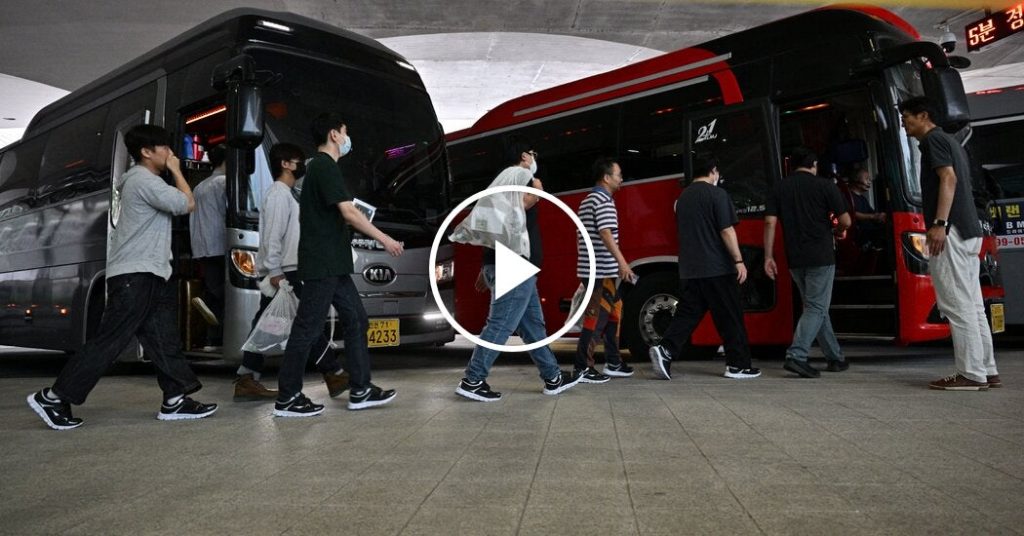Detained Hyundai Workers Return Home as Immigration Controversy Continues
South Korean Nationals Arrive After Major US Immigration Raid at Battery Factory
By David Mitchell
September 12, 2025
A government-chartered aircraft carrying approximately 300 South Korean nationals touched down at Incheon International Airport early Friday morning, marking the end of a tense diplomatic episode that began with one of the largest immigration enforcement actions in recent US history. The workers, most of whom had been employed at a Hyundai-affiliated battery factory construction site in Georgia, were detained during a sweeping Immigration and Customs Enforcement (ICE) raid last week that has sparked international controversy and renewed debate about America’s immigration policies.
As family members gathered at the airport in emotional reunion scenes, South Korean officials confirmed that all detainees had been processed and released into the care of their government. “Our primary concern has been the welfare and safe return of our citizens,” said Foreign Minister Park Ji-won during a press briefing. “While we continue diplomatic discussions with our American counterparts about the circumstances of this enforcement action, today we focus on reuniting families and providing necessary support services to those who have returned.” The workers, many visibly exhausted from their ordeal, were quickly processed through a specially arranged customs area before meeting waiting relatives, some of whom had traveled across the country upon hearing news of their imminent return.
The Raid That Sparked International Tension
The enforcement action that led to these detentions occurred at the construction site of a $5.8 billion EV battery manufacturing facility in Georgia, a joint venture between Hyundai and battery technology partner SK Innovation. According to US officials, the operation targeted workers allegedly employed using fraudulent visa documentation, though South Korean authorities have questioned both the scale and execution of the raid. “The manner in which nearly 300 of our nationals were detained raises serious concerns about proportionality and due process,” said Lee Sun-kyun, spokesperson for South Korea’s Ministry of Foreign Affairs, in a statement issued earlier this week.
Witnesses described a chaotic scene as hundreds of ICE agents surrounded the construction site during an early morning shift change on September 5th. “They came in with helicopters, dozens of vehicles, and officers in tactical gear,” said Kim Tae-woo, a project manager who was present but not detained during the operation. “Workers were confused, scared. Many didn’t understand what was happening because of language barriers.” The detainees were initially transported to processing facilities across three states before being consolidated at a detention center in Louisiana pending diplomatic negotiations and eventual repatriation arrangements.
Economic Implications and Corporate Response
The incident has cast a shadow over what has been touted as a signature economic partnership between the United States and South Korea. The battery facility, when completed, is expected to create over 2,000 permanent jobs and forms a critical component of both Hyundai’s global electric vehicle strategy and the Biden administration’s push to establish domestic battery production capacity. Market analysts have noted that the raid and subsequent diplomatic tensions have created uncertainty around the project’s timeline and could potentially impact investor confidence in similar initiatives.
Hyundai Motor Group released a statement expressing “deep concern” over the treatment of workers at the site, while simultaneously emphasizing its commitment to compliance with all US immigration laws. “We are conducting a thorough review of our contractor vetting processes to ensure full regulatory compliance,” the statement read. “Hyundai remains committed to the Georgia facility and our broader investment in American manufacturing.” Industry observers note that the incident highlights the complex supply chain and labor dynamics facing multinational corporations as they expand manufacturing operations into new markets, particularly in highly regulated sectors like electric vehicle production where government partnerships are crucial.
Human Stories Amid Policy Debates
Behind the corporate statements and diplomatic negotiations lie hundreds of individual stories. Many of the returned workers had left families behind in South Korea for what they believed would be lucrative temporary assignments in America. “My husband went to earn money for our daughter’s education,” said Park Mi-sook, who was waiting at Incheon Airport. “He called me from the detention center crying, saying he had done nothing wrong. These past eight days have been a nightmare for our family.” Advocacy groups have raised concerns about detention conditions, reporting that many workers had limited access to Korean-speaking legal counsel and faced difficulties communicating their situations to authorities.
The workers’ experiences have become focal points in ongoing debates about immigration enforcement priorities in the United States. Labor rights organizations have questioned whether the mass detention represented a proportional response to potential visa violations, particularly given the strategic economic importance of the project. “These enforcement actions don’t occur in a vacuum,” noted immigration attorney Jennifer Ramirez, who was not directly involved in the case. “They reflect policy choices about which violations merit resources and which communities face scrutiny. The scale of this operation against skilled workers at an economically significant site raises important questions about enforcement priorities.”
Diplomatic Aftermath and Policy Implications
As the immediate humanitarian concerns of repatriation have been addressed, attention now turns to the diplomatic and policy implications of the incident. South Korean President Yoon Suk-yeol has reportedly spoken directly with US President Biden about the matter, with both leaders agreeing to establish a joint working group to review visa procedures for large-scale industrial projects. The incident comes at a delicate time for US-South Korea relations, as the countries navigate complex security partnerships in response to regional challenges while also managing growing economic interdependence in critical technology sectors.
For the US domestic audience, the raid has reignited fierce debates about immigration enforcement just weeks before midterm elections. Republican lawmakers have generally supported the action as necessary enforcement of existing laws, while Democratic representatives have questioned both the tactics employed and the strategic wisdom of targeting workers at a project that had received significant federal support through clean energy initiatives. As the returned workers begin the process of reintegrating into life in South Korea, the policy discussions their experience has triggered will likely continue to reverberate through both countries’ political landscapes for months to come. The incident serves as a stark reminder of how immigration enforcement decisions intersect with international relations, economic strategy, and ultimately, human lives caught between competing national priorities and regulatory systems.
David Mitchell is a senior international correspondent covering global business and diplomacy for The Global Monitor.











